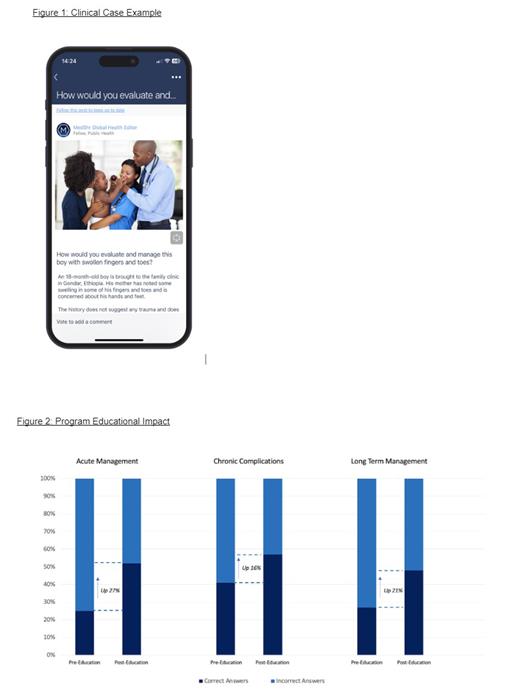Introduction
Sickle cell disease (SCD) is one of the world's most common hemoglobinopathies, affecting over 400,000 newborns annually (Archer et al., 2022). Despite the World Health Organisation's (WHO) 2006 long-term goals to address the SCD burden, the disease's mortality, particularly within low- and middle-income countries (LMICs) such as India and Sub-Saharan Africa (SSA), remains high (WHO 2006).
Barriers to improving outcomes for SCD patients in LMICs include a lack of awareness around treatment guidelines and inadequate clinical knowledge among healthcare professionals (HCPs). While effective medical education programs are essential to the provision of high-quality healthcare services, the delivery of such programs in LMICs is challenging due to limited budgets, poor training infrastructure and equipment, and insufficient educators (Barteit et al., 2020). Recently, consideration has been given to the role that digital learning platforms could play in supporting medical education in LMICs (Nicoll et al., 2018).
Aim
To assess the impact of a smartphone app delivered medical education program in improving HCP clinical knowledge around SCD in LMICs, focused on SSA (Kenya, Ghana, Zambia, Uganda,Tanzania) and India.
Methods
The SCD program was developed by subject matter experts with MedShr, a secure app- and web-based clinical case discussion platform freely accessible to HCPs worldwide.
The program's focus was determined at the outset through a needs-based approach. Analysis of MedShr's proprietary data enabled the identification of key knowledge gaps among HCPs that could be addressed with case-based education, forming the basis for three themes:
1) Acute SCD presentations
2) Chronic SCD complications
3) Long-term SCD management
9 clinical cases comprising a patient vignette, open question and integrated poll were developed by MedShr in line with the program themes. A case example is displayed in Figure 1. Content delivery via the MedShr platform was from August 2022 to February 2023, during which time the cases were promoted to relevant HCPs via email, push notifications and social media. All content was featured within a SCD Global Education Network group on MedShr, connecting target HCPs and facilitating peer-to-peer discussion.
Results
During the 6 month program, over 173,000 HCPs were reached globally with the educational content, including 75,070 clinicians in SSA and 64,210 in India. HCPs reached included community health workers (28%), GPs (24%), acute physicians (16%), emergency physicians (32%), pediatricians (13%), hematologists (3%), and nurses (8%). The program achieved over 73,000 engagements (case follows, likes, votes and comments) from target HCPs, including 26,419 engagements from HCPs in SSA and 11,173 from those in India.
Stand-alone poll questions aligned to the three educational themes were implemented pre- and post-program delivery to assess the program's educational impact. An improvement in clinician knowledge was demonstrated across all three themes (Figure 2).
Participant surveys were also used to determine the program's impact on HCP knowledge and clinical behaviors. 84% of participants deemed the content ‘very valuable’ to their clinical decision-making, while 90% stated that they had implemented knowledge obtained from the program in clinical practice.
Conclusions
The SCD program delivered via the MedShr smartphone app provided a low-cost, high-impact mechanism to deliver effective medical education in LMICs.
MedShr's unique SCD professional network provides a digital interface for HCPs, through which peer engagement, interactive discussion and sharing feedback drive learning and behavioral change. The program's metrics highlight the potential scale for digital learning platforms to reach and engage HCPs across diverse geographies, and the program polling and participant surveys demonstrate impact, and that there is scope to improve HCPs' knowledge and practice without costly face-to-face education.
Future work should aim to develop tailored learning programs designed to fit local contexts in LMICs, and explore the use of technology-based learning programs in other commonly encountered disease areas.
The educational program was funded by an unrestricted educational grant from Novartis. Novartis had no input into content development and their employees could not access the MedShr platform or members.
Disclosures
No relevant conflicts of interest to declare.


This feature is available to Subscribers Only
Sign In or Create an Account Close Modal